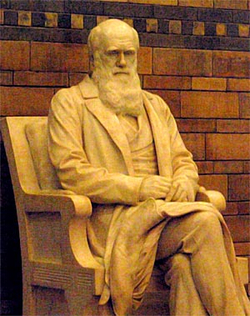The Greatest Honour
 |
In the last years of his life, Darwin was celebrated as a scientific hero. Although not everyone agreed with him, he was still recognized as one of the greatest scientists of his time, if not the greatest. In 1876 Cambridge University appointed its former student with an honorary doctorate. Darwin was enormously proud, and there was no doubt that this honour was very important to him. During the ceremony, students, for the fun of it, lowered an ape from the ceiling, and Darwin was very much amused.
He died on April 19th 1882. The plan was for him to be buried in the village church in Downe. Thomas Henry Huxley and Darwin’s cousin Francis Galton had other plans and initiated his burial in Westminster Abbey alongside Isaac Newton and a large part of the royal family. The church, which Darwin at one point imagined he would be serving, had now appointed him with the greatest honour. Darwin’s scientific work did however not need the church’s blessing. The Times pointed out that the church needed Darwin’s funeral more than he needed the church. Darwin had shown and convinced many that science could exist on its own with or without religious consent.
Peter C. Kjærgaard









